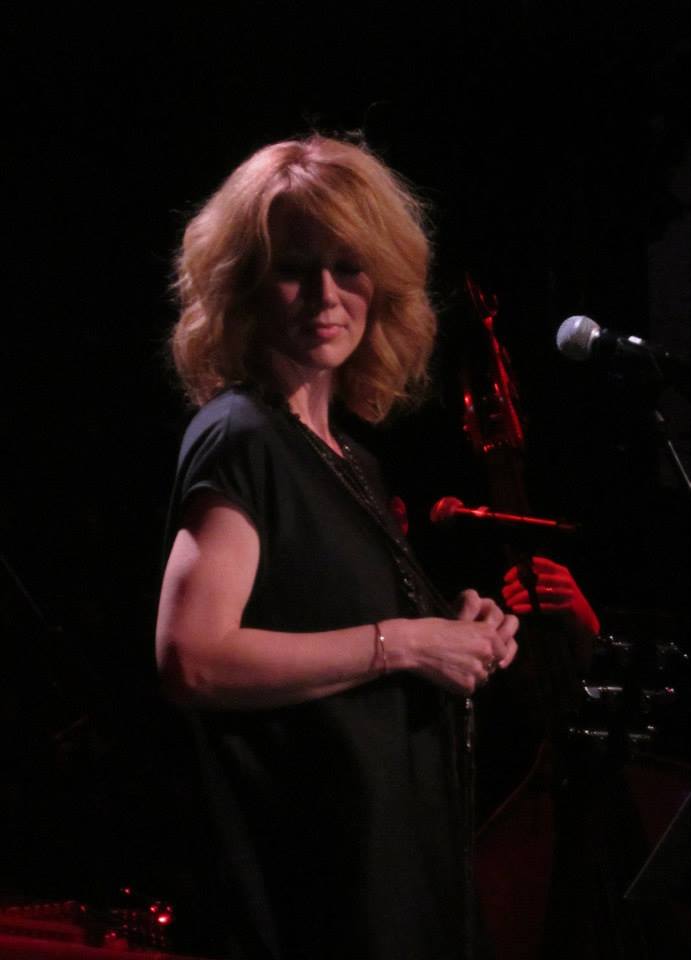It should not have surprised me that Allison Moorer singing about the South brought tears to my eyes. Indiana, where I was born, and St. Louis, where I went to fourth grade, are more Southern than is obvious from the map. A strain of my ancestry runs through Virginia and Kentucky, and the nursery years I spent in Alabama are my earliest memories. But still I was taken aback by how powerfully she moved me. BLUES FOR DIXIE: SONGS OF THE SOUTH did not, for the most part, consist of her own stuff, but the paens of others, from Hoagy Carmichael to Gladys Knight to Gram Parsons to Steve Earle. Stars fell on Alabama, night trains rolled to Georgia, hickory winds blew, and New Orleans rose from the flood.
Unlike her sister Shelby Lynne, who is androgynously protean, Moorer is big haired and womanly, as the parlance would have it, although she lives in New York City and permits herself a little S&M edginess in her footwear. She can be foul-mouthed when she wants to be, especially about “Yankees” who “talk shit about things they know nothin’ about,” such as the relative virtues of east and west Nashville, the which she would never presume to opine about “the best bagels.” The songs she sang were songs of place, the most romanticized of genres, finding the beauty nestled beside the rot, the dream in lieu of the nightmare, the South that might have been but probably isn’t.
She knows the rot too well. I wondered how many in the audience spotted the veiled reference to the quintessentially red state crime that destroyed her family. But songs of place are more impressionism than naturalism; the whole is beautiful whatever the particulars. Ambiance gives grace to circumstance; the smell, the look, the sound, the soil, the air, the human totality subsume the politics, the ideologies, the pathologies, the poverty or the wealth. The brushstrokes of the South are everywhere in Moorer’s persona. When her emotions chill it is ice storm instead of blizzard, and country love more than city love, never to be forgotten, but not forgiven either. She is sad like Spanish moss, and if her eyes turn steely you hope she doesn’t have a gun, except that she doesn’t need one. She could disarm you with a smile, or a look, or that Alabama drawl, whether, I would wager, you are a man or a woman.
Moorer is – having collaborated with the likes of Steve Earle and Howard Zinn – almost certainly a liberal. There is not a trace of overt polemic in what she sings, but she makes clear as crystal that she is doing more than simply celebrate. Her brilliant “Alabama Song” (not to be confused with the Brecht-Weill classic), which thickened the air at Joe’s Pub like the humidity of a Southern night, evokes the state of her upbringing so richly as to prod nostalgia in a Northern city. But something in the lyrics are just a little too much, and she lets on that she knows this in the penultimate line: “Any place‘ll do.” Under the pointillist glamor of a song of place, whether it celebrates a city, a state, a street, or a region, there is an arbitrariness to the selection of the where. Of the sisters Lynne and Moorer, magnetic artists each, Shelby is, on the surface, the most challenging to the imparted values of her region, but it is to Allison that the deeper irony belongs.
For more on Allison Moorer, click here. She will perform on Aug. 19, 2017, at City Winery with her sister Shelby Lynne: info. Visit Joe’s Pub for information on future events at that venue.
